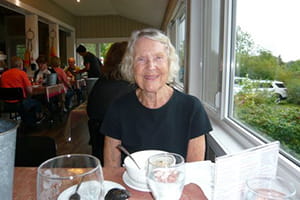The Challenge: Sudden, Unexplainable Illnesses
91-year-old Beverly (Bev) Meermans is an active lady.
The Rocky River, Ohio native, who currently lives in Wexford, Pa., likes spending her days out and about. She enjoys shopping, taking yoga classes at her local YMCA, socializing at her church, and going for long walks throughout North Park.
“In my 90 years of life, I never had a health problem,” Bev recalls.
So, when Bev found herself visiting the doctor time and again, plagued with “odd medical issues,” she knew something wasn’t right. Yet, at every visit, her doctor conducted tests and the results were “normal.”
“The doctors couldn’t figure out what was wrong with me. I had been going back and forth for a year,” Bev explains.
In January 2017, during one of these many visits, Bev’s doctor felt her condition worthy of further testing at the emergency room.
An echocardiogram (echo) to check the heart’s valves and muscles came back within a normal range. Bev went home — still without a diagnosis.
The Path to the UPMC Heart and Vascular Institute
Four months later, while attending a social event at her church, Bev’s health took a turn.
Bev was playing Mahjong — a game of skill involving tiles that originated from ancient Chinese culture — when something was suddenly very wrong.
“I couldn’t focus on anything. My mind went completely blank. I felt very faint,” Bev says.
Luckily, a fellow church member in attendance was a nurse and quickly jumped in to assess Bev. The nurse took Bev’s blood pressure and found it was “all over the place.”
An ambulance came to the church and rushed Bev to UPMC Passavant.
Bev had a series of tests and doctors admitted her to the hospital with cardiac failure. They ordered a second echo to assess the condition of Bev’s heart.
Lydia Davis, MD, a UPMC cardiologist specializing in echocardiography and nuclear cardiology, reviewed Bev’s two echocardiograms. The results showed a severe deterioration of Bev’s mitral valve, leading to the diagnosis of mitral valve regurgitation.
The mitral valve separates the left atrium of the heart from the left ventricle. It's responsible for pumping freshly oxygenated blood into the heart.
When mitral valve regurgitation occurs, the valve doesn't close properly. This causes blood to leak from the left ventricle back into the left atrium.
After taking Bev’s age and condition of her heart into consideration, Dr. Davis suggested the MitraClip® procedure.
The Solution: The MitraClip® Procedure
The minimally invasive MitraClip technique places a small clip onto the mitral valve to repair the damaged valve. It also prevents the blood from backflowing into the left atrium.
Doctors can perform the MitraClip procedure through a catheter. It's less invasive than having open heart surgery for mitral valve repair.
Always one to do her homework, Bev went home and researched the MitraClip in great detail. She learned how the technique typically occurs and about the types of people who have the MitraClip procedure.
“The MitraClip is specifically for people who aren't good candidates for or are unable to have regular open heart surgery,” Bev explains. “I really did not want to undergo open heart surgery, so I was pleased this was an option.”
Patients can often go home within a few days of the procedure. The shorter hospital stay was also something that excited Bev.
“I have things to do. I didn’t want to spend a long time in recovery!” Bev laughs.
There are only a handful of doctors trained to complete the MitraClip procedure in the region. Bev found comfort that her interventional cardiologist, A.J. Conrad Smith, MD, of the UPMC Heart and Vascular Institute, is one of them.
After discussing her options with her two sons and daughter-in-law, and having all her questions answered, Bev underwent the MitraClip.
Dr. Smith performed Bev's MitraClip procedure in July 2017. One day later, Bev returned to her home to recover and soon after engaged in the UPMC Cardiac Rehab program.
“I am 91 years old and doing beautifully,” Bev exclaims.
While she's not quite back to her five-mile walks throughout North Park, she is still staying busy and active. She also takes part in exercise classes at her church and enjoys doing yoga.
“I like to walk on the treadmill in my apartment. Or, when the weather is nice, I go for walks around the property where I live,” Bev says.
Bev is especially grateful for her care at UPMC and with the cardiology team.
“I was so impressed with Dr. Davis and her team and the surgical skills of Dr. Smith. Everyone was so great.”
When it comes to others who find themselves in situations like Bev was, she has this advice:
“Speak up for yourself. Do your research and have all your questions ready for the final discussion with your doctor before making a decision about treatment. Know exactly what is going to transpire and know that you have a say.”
Bev is looking forward to many more active days and recognizes UPMC’s role in her renewed health.
Bev's treatment and results may not be representative of similar cases.
Read more Heart Valve Disease patient stories
Learn More About Mitral Valve Disease
UPMC Heart and Vascular Institute
UPMC HealthBeat Blog



















